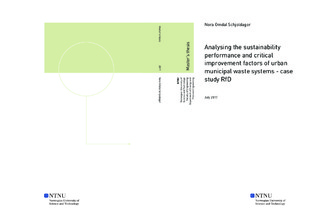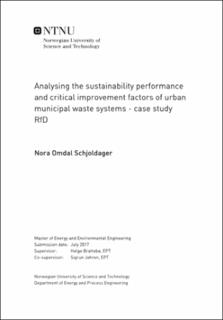| dc.description.abstract | The objective of this master's thesis is to analyse the environmental performance and critical improvement factors of urban waste systems. The thesis is a case study of the urban waste management system of RfD (Renovasjonsselskapet for Drammensregionen IKS) nad has been carried out in collaboration with them. RfD collects the municipal solid waste from the households in the Drammen region.
A literature study examines the relevant theoretical background regarding the waste management system, environmental performance and introduces relevant performance criteria. Based on these fundamental clarifications and findings, the used model to analyse the current situation and predicting future scenarios is then introduced before the actual case study is conducted.
The model is adjusted and applied on the given data of RfD s urban waste management system for the year of 2015. To analyse the current situation and compare them to future development, the years of 2015, 2025 and 2030 have been modelled. The model focuses on mass flows, energy use and CO2 emissions connected to relevant processes in the system. Different scenarios are examined in each year, the "reference scenario" represents "business as usual". For 2025 and 2030 the following scenarios are investigated: the "more underground" scenario, where a larger share of the collection containers are underground, and the "biogas" scenario, where parts of the collection vehicles are fuelled by biogas. For the year of 2030 a scenario called the "central sorting" scenario is also modelled, which includes a central sorting facility in the system.
The results of the analysis showed that material recycling, energy efficiency and GHG emissions are closely connected. Increased material recycling leads to a lower energy efficiency, but also lower GHG emissions and thus a better environmental performance. Increased material recycling can be achieved through improved sorting. Plastic and organic waste have here been identified as critical factors for the environmental performance of the system. Incineration has resulted to be the largest contributor to GHG emissions and should therefore be targeted. The system's GHG emissions are highly dependant on the energy consumption of the system as well as chosen CO2 emission factors.
Based on the results of this work, recommended measures for RfD are implementing a central sorting facility and encouraging better sorting in the households. The transition to collection vehicles fuelled by biogas proved to have a positive impact on the environmental performance of the waste management system. | |

